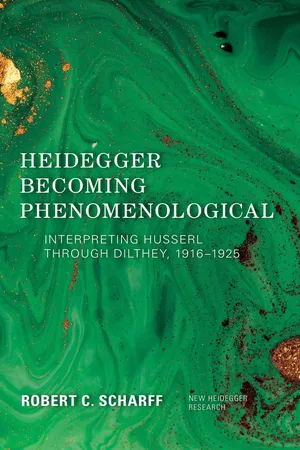
eBook - ePub
Heidegger Becoming Phenomenological
Interpreting Husserl through Dilthey, 1916–1925
- 192 pages
- English
- ePUB (mobile friendly)
- Available on iOS & Android
eBook - ePub
Heidegger Becoming Phenomenological
Interpreting Husserl through Dilthey, 1916–1925
About this book
In this first book-length study of the topic, Robert C. Scharff offers a detailed analysis of the young Heidegger's interpretation of Dilthey's hermeneutics of historical life and Husserl's transcendental phenomenology. He argues that it is Heidegger's prior reading of Dilthey that grounds his critical appropriation of Husserl's phenomenology. He shows that in Heidegger's early lecture courses, a "possible" phenomenology is presented as a genuine alternative with the modern philosophies of consciousness to which Husserl's "actual" phenomenology is still too closely tied. All of these philosophies tend to overestimate the degree to which we can achieve intellectual independence from our surroundings and inheritance. In response, Heidegger explains why becoming phenomenological is always a possibility; but being a phenomenologist is not. Scharff concludes that this discussion of the young Heidegger, Husserl, and Dilthey leads to the question of our own current need for a phenomenological philosophy—that is, for a philosophy that avoids technique-happiness, that at least sometimes thinks with a self-awareness that takes no theoretical distance from life, and that speaks in a language that is "not yet" selectively representational.
Frequently asked questions
Yes, you can cancel anytime from the Subscription tab in your account settings on the Perlego website. Your subscription will stay active until the end of your current billing period. Learn how to cancel your subscription.
No, books cannot be downloaded as external files, such as PDFs, for use outside of Perlego. However, you can download books within the Perlego app for offline reading on mobile or tablet. Learn more here.
Perlego offers two plans: Essential and Complete
- Essential is ideal for learners and professionals who enjoy exploring a wide range of subjects. Access the Essential Library with 800,000+ trusted titles and best-sellers across business, personal growth, and the humanities. Includes unlimited reading time and Standard Read Aloud voice.
- Complete: Perfect for advanced learners and researchers needing full, unrestricted access. Unlock 1.4M+ books across hundreds of subjects, including academic and specialized titles. The Complete Plan also includes advanced features like Premium Read Aloud and Research Assistant.
We are an online textbook subscription service, where you can get access to an entire online library for less than the price of a single book per month. With over 1 million books across 1000+ topics, we’ve got you covered! Learn more here.
Look out for the read-aloud symbol on your next book to see if you can listen to it. The read-aloud tool reads text aloud for you, highlighting the text as it is being read. You can pause it, speed it up and slow it down. Learn more here.
Yes! You can use the Perlego app on both iOS or Android devices to read anytime, anywhere — even offline. Perfect for commutes or when you’re on the go.
Please note we cannot support devices running on iOS 13 and Android 7 or earlier. Learn more about using the app.
Please note we cannot support devices running on iOS 13 and Android 7 or earlier. Learn more about using the app.
Yes, you can access Heidegger Becoming Phenomenological by Robert C. Scharff in PDF and/or ePUB format, as well as other popular books in Philosophy & Phenomenology in Philosophy. We have over one million books available in our catalogue for you to explore.
Information
177Index
actuality (Husserl), xvi, 74, 100, 132, 150–151
ahistorical consciousness, 38–39, 68, 89–90, 97–98, 100–101, 115, 139–140
American Philosophical Association, 159
analytic of Dasein, 64, 65, 72, 137–138, 156–157. See also Dasein, hermeneutic phenomenology of
analytical interpretation: of other philosophers, 4–5, 52, 94, 100
apprehension: objective (Dilthey), 55–78; of objects as things, 67–68, 95, 101–102, 111–112, 129–132, 136
Aristotle, 3–4, 91, 105, 140, 155
articulation. See expressions (manifestations) of life (Lebensäußerungen, Dilthey)
assertions (claims), 6–7, 25, 50–51, 51–52, 92, 95
attitude, philosophical (Einstellung, Heidegger): 4–5, 90–91, 121, 140, 159–160, 163; basic (or phenomenological), 4, 129–140, 147, 151, 154–155; Dilthey’s basic, 130; Husserl’s basic, 6, 38–39, 49–50;...
Table of contents
- Contents
- Acknowledgments
- Notes on Frequent Citations (Full Documentation in References)
- Preface
- Introduction—Preparing to “Be” Phenomenological
- From Dilthey to Heidegger
- Heidegger’s Destructive Retrieval of Dilthey’s “Standpoint of Life”
- From Dilthey to Husserl
- Heidegger’s Diltheyian Retrieval of Husserl’s Two Sides
- Conclusion—Continuously “Becoming” Phenomenological
- References
- Index